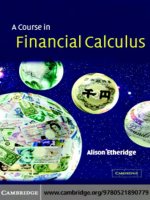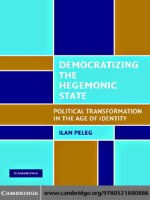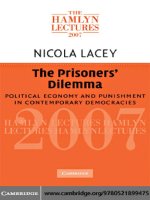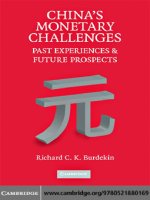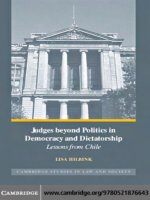0521800587 cambridge university press richard rorty jul 2003
Bạn đang xem bản rút gọn của tài liệu. Xem và tải ngay bản đầy đủ của tài liệu tại đây (1.36 MB, 223 trang )
This page intentionally left blank
Richard Rorty
Arguably the most influential of all contemporary English-speaking philosophers, Richard Rorty has transformed the way many inside and outside philosophy think about the discipline and the traditional ways of practicing it. Drawing
on a wide range of thinkers from Darwin and James to Quine, Wittgenstein,
Heidegger, and Derrida, Rorty has injected a bold antifoundationalist vision
into philosophical debate, into discussions in literary theory, communication
studies, political theory, and education, and – as a public intellectual – into
national debates about the responsibilities of America in the modern world.
The essays in this volume offer a balanced exposition and critique of Rorty’s
views on knowledge, language, truth, science, morality, and politics. The editorial introduction presents a valuable overview of Rorty’s philosophical vision.
Written by a distinguished roster of philosophers, this volume will have an unusually wide appeal outside philosophy to students in the social sciences, literary
studies, cultural studies, and political theory.
Charles Guignon is Professor of Philosophy at the University of South Florida.
David R. Hiley is Provost and Professor of Philosophy at the University of
New Hampshire.
Contemporary Philosophy in Focus
Contemporary Philosophy in Focus offers a series of introductory volumes
to many of the dominant philosophical thinkers of the current age. Each volume consists of newly commissioned essays that cover major contributions of
a preeminent philosopher in a systematic and accessible manner. Comparable
in scope and rationale to the highly successful series Cambridge Companions
to Philosophy, the volumes do not presuppose that readers are already intimately familiar with the details of each philosopher’s work. They thus combine
exposition and critical analysis in a manner that will appeal both to students
of philosophy and to professionals, as well as to students across the humanities
and social sciences.
forthcoming volumes:
Paul Churchland edited by Brian Keeley
Ronald Dworkin edited by Arthur Ripstein
Jerry Fodor edited by Tim Crane
Hilary Putnam edited by Yemima Ben-Menahem
Charles Taylor edited by Ruth Abbey
Bernard Williams edited by Alan Thomas
published volumes:
Daniel Dennett edited by Andrew Brook and Don Ross
Robert Nozick edited by David Schmidtz
Thomas Kuhn edited by Thomas Nickles
Stanley Cavell edited by Richard Eldridge
Alasdair MacIntyre edited by Mark C. Murphy
Donald Davidson edited by Kirk Ludwig
John Searle edited by Barry Smith
Richard Rorty
Edited by
CHARLES GUIGNON
University of South Florida
DAVID R. HILEY
University of New Hampshire
Cambridge, New York, Melbourne, Madrid, Cape Town, Singapore, São Paulo
Cambridge University Press
The Edinburgh Building, Cambridge , United Kingdom
Published in the United States of America by Cambridge University Press, New York
www.cambridge.org
Information on this title: www.cambridge.org/9780521800587
© Cambridge University Press 2003
This book is in copyright. Subject to statutory exception and to the provision of
relevant collective licensing agreements, no reproduction of any part may take place
without the written permission of Cambridge University Press.
First published in print format 2003
-
isbn-13 978-0-511-07171-3 eBook (EBL)
-
eBook (EBL)
isbn-10 0-511-07171-X
-
isbn-13 978-0-521-80058-7 hardback
-
isbn-10 0-521-80058-7 hardback
-
isbn-13 978-0-521-80489-9 paperback
-
paperback
isbn-10 0-521-80489-2
Cambridge University Press has no responsibility for the persistence or accuracy of
s for external or third-party internet websites referred to in this book, and does not
guarantee that any content on such websites is, or will remain, accurate or appropriate.
Contents
Contributors
Acknowledgments
Abbreviations
1
Introduction: Richard Rorty and Contemporary Philosophy
page ix
xi
xiii
1
charles guignon and david r. hiley
2
Rorty’s Critique of Epistemology
41
gary gutting
3
Rorty on Knowledge and Truth
61
michael williams
4
From Realism or Antirealism to Science as Solidarity
81
joseph rouse
5
Rorty’s Democratic Hermeneutics
105
georgia warnke
6
Rorty’s Inspirational Liberalism
124
richard j. bernstein
7
Don’t Be Cruel: Reflections on Rortyan Liberalism
139
jean bethke elshtain
8
Rorty and Philosophy
158
charles taylor
Bibliography
181
Index
201
vii
Contributors
richard j. bernstein, Vera List Professor of Philosophy and Dean of
the Graduate Faculty at New School University, specializes in American
pragmatism, social and political theory, and critical theory. He is the author of Praxis and Action (1971); Beyond Objectivism and Relativism: Science, Hermeneutics, and Praxis (1983); and, more recently, Freud and the
Vexed Legacy of Moses (1998) and Radical Evil: A Philosophical Interrogation
(2002).
jean bethke elshtain is Professor of Political Science at the University
of Chicago. She has been a Fellow at the Institute for Advanced Study,
Princeton University, and a Scholar in Residence at the Rockefeller Foundation Bellagio Conference and Study Center in Como, Italy. Her most
recent works include The King Is Dead (1998), Political Mothers (1998), and
Democracy on Trial (1995).
charles guignon, Professor of Philosophy at the University of South
Florida, specializes in contemporary continental philosophy. Editor of The
Cambridge Companion to Heidegger (1993) and coauthor of Re-envisioning
Psychology (1999), he has also edited several readers, including The Good Life
(1999) and Existentialism: Basic Writings (2nd ed., 2001), and he has written
on hermeneutics, Heidegger, and Rorty.
gary gutting is Professor of Philosophy at the University of Notre
Dame. He specializes in contemporary French philosophy, philosophy of
science, and philosophy of religion. He is the author of several volumes
including Religious Belief and Religious Skepticism (1982), Michel Foucault’s
Archaeology of Scientific Reason (1989), Pragmatic Liberalism and the Critique of Modernity (1998), and French Philosophy in the Twentieth Century
(2002), as well as the editor of The Cambridge Companion to Foucault
(1994).
ix
x
Contributors
david r. hiley is Provost and Vice President of Academic Affairs and
Professor of Philosophy at the University of New Hampshire. His current
work is in social and political philosophy. He is author of Philosophy in
Question: Essays on a Pyrrhonian Theme (1988) and coeditor of The Interpretive
Turn: Philosophy, Science, and Culture (1991).
joseph rouse is Professor of Philosophy and Chair of the Science in
Society Program at Wesleyan University. He specializes in the philosophy
of science and is author of How Scientific Practices Matter: Reclaiming Philosophical Naturalism (2002), Engaging Science: How to Understand Its Practices
Philosophically (1996), and Knowledge and Power: Toward a Political Philosophy
of Science (1987).
charles taylor is Professor Emeritus at McGill University and Board of
Trustee Professor of Law and Philosophy at Northwestern University. He
is the author of Hegel (1975), Sources of the Self (1989), and, most recently,
Varieties of Religion Today (2002).
georgia warnke is Professor of Philosophy and Department Chair at the
University of California, Riverside. She specializes in sociopolitical philosophy, contemporary German philosophy, feminist philosophy, and ethics.
Her recent publications include Legitimate Differences: Interpretation in the
Abortion Controversy and Other Public Debates (1999), Justice and Interpretation
(1993), and Gadamer: Hermeneutics, Tradition and Reason (1987).
michael williams, Professor of Philosophy at Johns Hopkins University,
has taught at Yale, the University of Maryland, and Northwestern University. He specializes in epistemology (with special reference to skepticism),
philosophy of language, and the history of modern philosophy, and he is the
author of Groundless Belief (1977), Unnatural Doubts (1992), and Problems of
Knowledge: A Critical Introduction to Epistemology (2001).
Acknowledgments
For offering valuable suggestions and for help in preparing this volume,
many thanks are due to Kevin Aho, Indrani Bhattacharjee, Craig Bradley,
Michael Gibbons, Christopher Kirby, Bruce Silver, Joanne Waugh, and
Eric Winsberg. We are deeply grateful to Terry Moore of Cambridge
University Press for his continuing support for this volume and for his
patience through seemingly interminable delays.
Parts of Jean Bethke Elshtain’s essay previously appeared in The Politics of
Irony: Essays in Self-Betrayal, edited by Daniel W. Conway and John E. Seery.
We are grateful to St. Martin’s Press for permission to reprint these passages.
We have a special debt of gratitude to Dick Rorty. Through the years
he has shown boundless generosity and kindness to colleagues around the
world, as well as to students, fans, and critics. As recipients of this kindness
at important points in our careers, we cannot think of a better person to
dedicate this book to than Dick Rorty himself.
xi
Abbreviations
Works by Rorty
AC
Achieving Our Country: Leftist Thought in Twentieth Century America.
Cambridge, MA: Harvard University Press, 1998.
CIS
Contingency, Irony, and Solidarity. Cambridge: Cambridge University Press, 1989.
CP
Consequences of Pragmatism. Minneapolis: University of Minnesota
Press, 1982.
EHO
Essays on Heidegger and Others, Philosophical Papers, Volume 2.
Cambridge: Cambridge University Press, 1991.
PMN
Philosophy and the Mirror of Nature. Princeton: Princeton University
Press, 1979.
PSH
Philosophy and Social Hope. Harmondsworth: Penguin, 1999.
ORT
Objectivity, Relativism, and Truth, Philosophical Papers, Volume 1.
Cambridge: Cambridge University Press, 1991.
TP
Truth and Progress, Philosophical Papers, Volume 3. Cambridge:
Cambridge University Press, 1998.
Work by Other Authors
RHC
Robert B. Brandom, ed., Rorty and His Critics. Oxford: Blackwell,
2000.
xiii
Richard Rorty
1
Introduction
Richard Rorty and Contemporary Philosophy
CHARLES GUIGNON AND DAVID R. HILEY
1. INTRODUCTION
Richard Rorty has been a lightning rod for conflicting currents in recent
philosophy. No American philosopher in the second half of the twentieth
century generated such an intense mixture of consternation, enthusiasm,
hostility, and confusion. His controversial positions in debates about the
nature of mind, language, knowledge, truth, science, ethics, and politics
have been regarded by some as opening fresh new possibilities for thought
and by others as undermining the very possibility of meaningful inquiry. His
more recent praise of American democratic culture and 1930s progressivism
is seen by some as a needed antidote to the academic left and by others as
politically na¨ıve.
While Rorty is arguably the most controversial American philosopher
within the discipline of philosophy itself, he has also been the most influential American philosopher since John Dewey in other areas of inquiry. At a time when the discipline of philosophy has become increasingly professionalized, technical, and remote from the rest of culture,
Rorty’s work has moved freely in and influenced such areas as literary
theory, law, historiography, psychotherapy, education, and social theory.
He writes regularly for the popular press, and he is a frequent lecturer
and symposium participant in events drawing nonphilosophical audiences
on a wide range of culturally important issues. He has reestablished the
philosopher as public intellectual and has been no less controversial in that
role.
Rorty’s influence outside of philosophy is not accidental. It follows
from the very reason he is so controversial to traditional philosophers.
For three decades Rorty has been attacking the concept of philosophy that
has been responsible for both its remoteness and its increasing professionalization. In the Introduction to Philosophy and the Mirror of Nature, the
book that launched Rorty’s reputation as contemporary philosophy’s chief
1
2
Charles Guignon and David R. Hiley
gadfly, he characterized the traditional view of philosophy in the following
way:
Philosophers usually think of their discipline as one which discusses perennial, eternal problems – problems which arise as soon as one reflects. Some of
these concern the difference between human beings and other beings, and
are crystallized in questions concerning the relation between the mind and
the body. Other problems concern the legitimation of claims to know,
and are crystallized in questions concerning the “foundations” of knowledge. To discover these foundations is to discover something about the
mind, and conversely. Philosophy as a discipline thus sees itself as the
attempt to underwrite or debunk claims to knowledge made by science,
morality, art, or religion. It purports to do this on the basis of its special understanding of the nature of knowledge and mind. Philosophy can be foundational in respect to the rest of culture because culture is an assemblage of
claims to knowledge, and philosophy adjudicates such claims. (PMN 3)
Rorty captures the source of this view of philosophy – a view extending from
Plato through Kant and into our own day – in the metaphor that forms the
title of his book. “The picture which holds traditional philosophy captive
is that of mind as a great mirror containing various representations – some
accurate, some not – and capable of being studied by pure, nonempirical
methods” (PMN 12). Philosophy’s task is to use its special methods in order
to secure the relationship between the mind’s representations and the world
represented. On such a view, philosophy is foundational for culture because
it is the tribunal of reason before which all other areas of inquiry are to
be judged. Rorty believes that philosophy’s remoteness from the rest of
culture follows from this privileged and special self-understanding – “the
cultural overseer who knows everyone’s common ground . . . who knows
what everybody else is really doing whether they know it or not, because
[philosophy] knows about the ultimate context . . . within which they are
doing it” (PMN 317–18).
For the past three decades, Rorty has sought to dispel the image of the
mirror of nature and the view of philosophy proper to it. In its place he has
championed the view of the philosopher as “the informed dilettante, the
polypragmatic, Socratic intermediary” (PMN 318) between various forms
of inquiry. This is the role Rorty himself has occupied. And he has occupied it fearlessly and with considerable panache. This too explains why
he has been so widely read outside of the discipline of philosophy. Few
philosophers are so engaging to read. He writes with self-effacing charm,
a quick and biting wit, a dizzying capacity for broad analogies, and a way
Introduction
3
of dividing through diverse thinkers in a single sentence that in less skilled
hands would be mere pastiche. Let one brief sample, picked almost at random, serve: “When we consider examples of alternative language games –
the vocabulary of ancient Athenian politics versus Jefferson’s, the moral
vocabulary of Saint Paul versus Freud’s, the jargon of Newton versus that
of Aristotle, the idiom of Blake versus that of Dryden – it is difficult to
think of the world as making one of these better than another, of the world
as deciding between them” (CIS 5). Rorty seems to read everything. He
moves easily from Wittgenstein to Heidegger or from Dewey to Derrida,
but he is as apt to draw from a Philip Larkin poem, from Proust, or from a
Nabokov novel as from Kant or Nietzsche.
Rorty seems to have always been a voracious reader. In a rare autobiographical essay he describes his childhood as bookish and solitary. He
grew up in a household steeped in leftist politics. “When I was 12, the most
salient books on my parents’ shelves were two red-bound volumes, The
Case of Leon Trotsky and Not Guilty. These made up the report of the Dewey
Commission of Inquiry into the Moscow Trials. I never read them with the
wide-eyed fascination I brought to books like Krafft-Ebing’s Psychopathia
Sexualis, but I thought of them in the way which other children thought
of their family’s Bible: they were books that radiated redemptive truth and
moral splendour” (PSH 5). He also read Marx, Marius the Epicurean, Proust,
Eliot, Plato, The Brothers Karamazov, and so forth. And he devoured books
about wild orchids. His was an unusual childhood and family.
Rorty was born in 1931, the only child of James and Winifred Raushenbush Rorty.1 James and Winifred Rorty were prominent in leftist and literary circles in New York. James was sympathetic to the Communist Party,
though he never became a member. During the 1920s, he served as editor of The New Masses, a Communist journal that published the likes of
John Dos Passos, Ezra Pound, Upton Sinclair, and other then-controversial
writers. Winifred Rorty was also a writer – a specialist on race relations –
and like James she was a Communist and active on behalf of leftist social
causes. Daughter of the well-known theologian Walter Rauschenbusch,
the founder of the Social Gospel Movement, she was steeped in progressive values and the connections of a socially active and politically conscious
family. She had been a graduate student of Robert Parker at the University
of Chicago during the heyday of the Chicago School of social theorists.
When Richard was barely a year old, James and Winifred made a highly
contentious break with the Communist Party. Along with a few others,
they were convinced that Stalin had betrayed communism, and they were
concerned by the extent to which the Communist Party in America was
4
Charles Guignon and David R. Hiley
controlled from Moscow. In the overheated politics of the day, such a break
produced enemies of former colleagues, along with their disillusionment
about communism. The Rortys left New York for the remote rural community of Flatbrookville in the Delaware Water Gap area of New Jersey.
Richard grew up in Flatbrookville, dividing his attention between his books,
his fascination with wild orchids, and the stream of guests of his parents
that included John Dewey, Carlo Tresca (the Italian anarchist), John Frank
(Trotsky’s secretary, who lived with the Rortys under an assumed name),
Sidney Hook, Whittaker Chambers, and Lionel Trilling. Rorty says of this
period:
I grew up knowing that all decent people were, if not ‘Trotskyites’ at least
socialists. I also knew that Stalin had ordered not only Trotsky’s assassination
but also Kirov’s, Ehrlich’s, Alter’s and Carlo Tresca’s . . . I knew that poor
people would always be oppressed until capitalism was overcome . . . [I knew]
a lot about what factory owners did to union organizers, plantation owners
to sharecroppers, and the white locomotive engineers’ union to the coloured
firemen (whose jobs white men wanted, now that the diesel engines were
replacing coal-fired steam engines). So, at 12, I knew that the point of being
human was to spend one’s life fighting social injustice. (PSH 6)
Though raised in the causes of social justice, Rorty records that he also had
an abstract, absolutist, and aesthetic bent. While in Flatbrookville, he went
through a religious period and also developed his lifelong Wordsworthian
love of nature, especially wildflowers and birds.
At fifteen his parents enrolled him in a new college for precocious
teenagers at the University of Chicago. As Rorty recounts it: “At fifteen
I escaped from the bullies who regularly beat me up on the playground
of my high school . . . by going off to the so-called Hutchins College
of the University of Chicago. (This was the institution immortalized by
A. J. Liebling as ‘the biggest collection of juvenile neurotics since the Children’s Crusade’.).” Rorty reports – in an especially telling observation –
that insofar as he had any project in mind at the university, it was “to find
some intellectual or aesthetic framework which would let me – in a thrilling
phrase which I came across in Yeats – ‘hold reality and justice in a single
vision’” (PSH 7).
To hold reality and justice in a single vision: how better to express
the fundamental goal of the philosophical tradition initiated by Plato? “I
read through Plato during my fifteenth summer, and convinced myself that
Socrates was right – virtue was knowledge. That claim was music to my
ears, for I had doubts about my own moral character and a suspicion that
Introduction
5
my only gifts were intellectual ones” (PSH 9). He did his best at Chicago
to be a Platonist but, as he puts it, “it didn’t pan out.” He worried about
the tension in Plato’s thought between constructing arguments for one’s
position that will convince all comers and achieving the incommunicable
certainty of the Good that lies beyond dialectic and argument. He worried
about the problem of giving noncircular arguments for one’s first principles
and the inability to achieve a neutral standpoint from which to adjudicate
alternative first principles. He came to worry about the worth of philosophical talent itself, since it seemed to come to nothing more than “a matter of
proliferating as many distinctions as were needed to wriggle out of a dialectical corner. . . . I became less and less certain that developing this skill was
going to make me either wise or virtuous. . . . Since that initial disillusion
(which climaxed about the time I left Chicago to get a Ph.D. in philosophy
at Yale), I have spent 40 years looking for a coherent and convincing way
of formulating my worries about what, if anything, philosophy is good for”
(PSH 10–11).
Though he may have harbored doubts about the possibility of holding reality and justice in a single vision, and though he may have worried
about what philosophy was good for, the early years of his academic career –
first at Wellesley College and then at Princeton – seem firmly grounded
in the philosophical mainstream. Since World War II, the philosophical
mainstream in the United States was defined by logical positivism and its
aftermath. Rudolf Carnap, Carl Hempel, and other prominent philosophers fleeing the rise of Nazism came to occupy important positions in
America, bringing with them the methods of logical analysis of language
that served to render traditional metaphysical questions nonsensical. They
brought an ambitious view of the unity of science through the reduction
of all scientific inquiry to physics and a view of philosophy as providing
the foundations of science. The ascent of positivism in American philosophy departments served to marginalize indigenous philosophers such as
James, Dewey, and Lovejoy. It also provided the logical apparatus to dismiss the metaphysical and humanistic interests of contemporary German
and French philosophers. For at least a generation of analytically trained
American philosophers, Heidegger was known only through a paragraph
from “What Is Metaphysics?” that Carnap cited to demonstrate the power
of the logical analysis of language to ferret out metaphysical nonsense. The
methods of logical analysis of language and the alliance of philosophy and
science relegated the history of philosophy to antiquarian interest. Philosophy had to do with the problems of meaning, truth, and knowledge, to
which it brought its special methods of analysis.
6
Charles Guignon and David R. Hiley
If one knew Rorty only through the handful of papers he published
early in his career, he would appear to be a reasonably skilled and welltrained analytic philosopher. He published papers in the mid-1960s and
early 1970s on the mind–body identity theory, arguing against the incorrigibility of mental representations and favoring what he termed “eliminative
materialism.” He edited a collection of essays under the title The Linguistic
Turn, which brought together a range of philosophers writing on the topics of language, meaning, and truth – then central to analytic philosophy.
He wrote on Wittgenstein and Strawson. He seemed to be staking out a
career as another talented philosopher applying the methods of analytic
philosophy to the perennial problems of the nature of mind, language, and
reality.
In retrospect, of course, we can see that something else was going on.
Perhaps a better indication of what he was thinking could be found not in
the papers he was then known for but in the books he was reading and reviewing throughout the 1960s – John Blewett’s John Dewey: His Thought and
Influence; Raymond Aron’s Introduction to the Philosophy of History; Edward
Moore’s American Pragmatism: Peirce, James, and Dewey; Paul Goodman’s
Utopian Essays and Practical Proposals; Edward Madden’s Chauancy Wright and
the Foundations of Pragmatism; H. D. Lewis’s Clarity Is Not Enough: Essays
in Criticism of Linguistic Philosophy. In retrospect, we can take seriously
¨
Rorty’s introduction to The Linguistic Turn – as Jurgen
Habermas has recently done2 – in which he raises doubts about the future of analytic philosophy, writing about it in the past tense, and in which he announces his
anti-Platonic sympathies with Heidegger and the later Wittgenstein. In
retrospect, we can see that Rorty’s eliminative materialism, then deemed
to be merely one among various alternative positions available in the debate over mind–body identity, was actually an attempt to undermine the
entire modern (Cartesian) philosophical tradition that organized the world
in terms of mind and matter.
For mainstream (that is, analytic) philosophers in the 1960s, however, Rorty was a mainstream philosopher. That perception changed in
December 1972, however, when he delivered a paper at the annual meeting
of the Eastern Division of the American Philosophical Association (APA)
titled “The World Well Lost.” Rorty, of course, had been trying out the
ideas in this paper prior to the APA presentation and its subsequent publication in the Journal of Philosophy. But to most who heard and read this paper,
it was a turning point. Marshaling the views of W. V. O. Quine, Wilfred
Sellars, and Donald Davidson, Rorty sought to trivialize then-current debates over correspondence and coherence theories of truth and scientific
Introduction
7
realism in order to undermine the very notion of a world independent of
thought. Even more disconcerting, he had good things to say about Dewey.
The paper ended with the claim that “if we can come to see both the coherence and correspondence theories [of truth] as non-competing trivialities,
then we may finally move beyond realism and idealism and to the point at
which, in Wittgenstein’s words, we are capable of stopping doing philosophy when we want to” (CP 17).
Throughout the 1970s, Rorty published papers that blended the ideas
of Dewey, Heidegger, and Wittgenstein in a crusade against any concept
of philosophy that gives legitimacy to mainstream philosophical debates
about truth, knowledge, and realism. Worse, he took Derrida seriously,
taught Michel Foucault’s works in his classes, and paid attention to what
was happening in English departments where new approaches to literary
theory were emerging. He was also traveling the lecture circuit, trying out
chapters of what would become Philosophy and the Mirror of Nature.
Philosophy and the Mirror of Nature is in some sense a “god that failed”
book for Rorty. In it he aimed to show why reality and justice could not be
held in a single vision, and why the view of philosophy that runs from Plato
and Kant through contemporary analytic philosophy does not come to very
much. It is one thing, however, to place this book in Rorty’s intellectual
development and the philosophical context in which it was written. It is
another thing to get clear about what his position is and the basis for it.
2. THE PRAGMATIST CRITIQUE OF EPISTEMOLOGY-CENTERED PHILOSOPHY
Philosophy and the Mirror of Nature challenged a conception of philosophy
that was almost universally accepted among mainstream Anglo-American
philosophers in the 1970s. This conception of philosophy, inherited from
Descartes and given its clearest formulation by Kant, holds that before
philosophers begin to speculate about what is and what ought to be, they
should first get clear about what they can know and what they can’t know.
For this standard conception of philosophy, theory of knowledge is “first
philosophy,” and all other areas of philosophy should accede to its judgments about the limits of knowledge. At the heart of traditional epistemology is “representationalism,” the view that we are, at the most basic level,
minds containing beliefs of various sorts, and that our first task is to make
sure our beliefs accurately represent reality as it is in itself. The project of
determining which representations are accurate and which are not is seen
as having broad implications for culture as a whole. Philosophy aims to be

